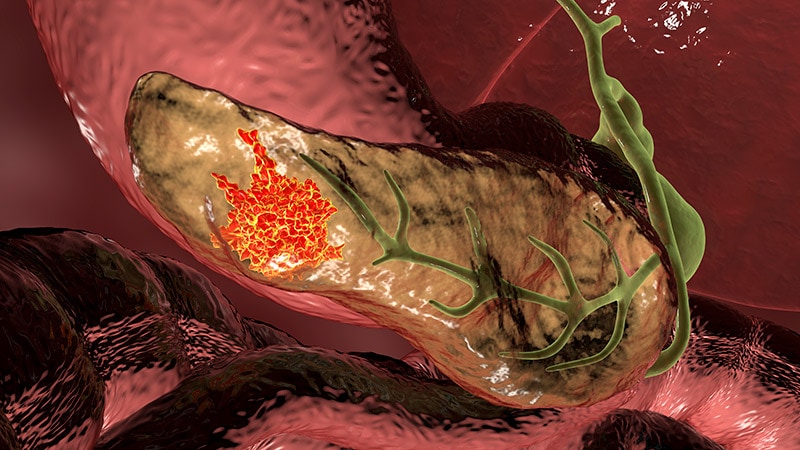The Importance of Staging Laparoscopy in Pancreatic Cancer Care
Core Concepts
Performing staging laparoscopy in pancreatic cancer patients aids in identifying metastatic disease and cancer stage, influencing management decisions.
Abstract
TOPLINE:
Staging laparoscopy before resection helps identify metastatic disease and cancer stage.
Management changes occurred in 1 in 5 patients.
METHODOLOGY:
1004 patients underwent staging laparoscopy at Mayo Clinic Rochester.
Median age: 66 years; 48% female.
Tumor location: 64% proximal, 36% distal.
Upfront resectable disease: 35%, borderline resectable or locally advanced: 65%.
TAKEAWAY:
180 patients had positive staging laparoscopy.
Neoadjuvant chemotherapy before laparoscopy reduced positive rates.
23% of chemo-naive patients with peritoneal lavage had positive laparoscopy.
21% of patients with peritoneal washings had confirmed metastatic disease.
IN PRACTICE:
Staging laparoscopy recommended before resection or neoadjuvant therapy.
Especially in patients with high-risk features.
SOURCE:
Study led by Hallbera Gudmundsdottir, MD, published in the Journal of the American College of Surgeons.
LIMITATIONS:
Study population may not be generalizable to other centers.
DISCLOSURES:
No financial interests disclosed.
How Staging Laparoscopy Informs Pancreatic Cancer Care
Stats
Performing a minimally invasive staging procedure on newly diagnosed pancreatic cancer patients prompted a change in management in about 1 in 5 patients.
Median tumor size was 29 mm.
23% of chemo-naive patients with concurrent peritoneal lavage had positive laparoscopy.
Among patients with positive staging laparoscopy, median overall survival was 11 months in those with gross metastatic disease and 13 months in those with positive peritoneal cytology only.
Quotes
"Staging laparoscopy should be considered in the majority of patients prior to resection and/or initiation of neoadjuvant therapy, specifically in patients with high-risk features such as indeterminate extrapancreatic lesions on imaging, young age, large tumor size, distal tumor location, or elevated serum tumor markers," - Authors
Key Insights Distilled From
by Patricia Mck... at www.medscape.com 07-20-2023
https://www.medscape.com/viewarticle/994594
Deeper Inquiries
How can the findings of this study impact current practices in pancreatic cancer care?
The findings of this study can significantly impact current practices in pancreatic cancer care by highlighting the importance of staging laparoscopy in identifying metastatic disease and determining cancer stage before resection or initiation of neoadjuvant therapy. The study showed that performing a minimally invasive staging procedure on newly diagnosed patients with pancreatic cancer led to a change in management in about 1 in 5 patients. This suggests that incorporating staging laparoscopy into routine practice can help improve patient outcomes by ensuring appropriate treatment strategies are implemented based on accurate staging information.
What are the potential drawbacks of relying heavily on staging laparoscopy for treatment decisions?
While staging laparoscopy is a valuable tool in pancreatic cancer care, there are potential drawbacks to relying heavily on this procedure for treatment decisions. One drawback is the possibility of false-positive or false-negative results, which can lead to unnecessary treatments or missed opportunities for appropriate interventions. Additionally, staging laparoscopy is an invasive procedure that carries risks such as infection, bleeding, or injury to surrounding organs. Over-reliance on staging laparoscopy may also result in increased healthcare costs and resource utilization. It is essential to balance the benefits of staging laparoscopy with its limitations and consider other diagnostic modalities in conjunction with this procedure to make well-informed treatment decisions.
How can advancements in laparoscopic technology further improve the accuracy and efficiency of staging procedures?
Advancements in laparoscopic technology have the potential to further improve the accuracy and efficiency of staging procedures in pancreatic cancer care. Innovations such as high-definition imaging systems, robotic-assisted platforms, and enhanced instrumentation can provide better visualization of the surgical field, allowing for more precise identification of metastatic disease and accurate staging of cancer. Additionally, improvements in laparoscopic techniques, such as fluorescence-guided surgery or molecular imaging, can enhance the detection of small lesions or micrometastases that may be missed with conventional methods. These technological advancements can help reduce the risk of false-positive or false-negative results, optimize patient outcomes, and streamline the staging process, ultimately leading to more personalized and effective treatment strategies for patients with pancreatic cancer.
0
More on Healthcare
